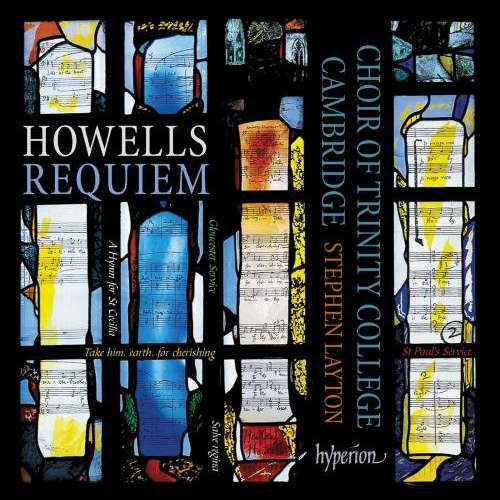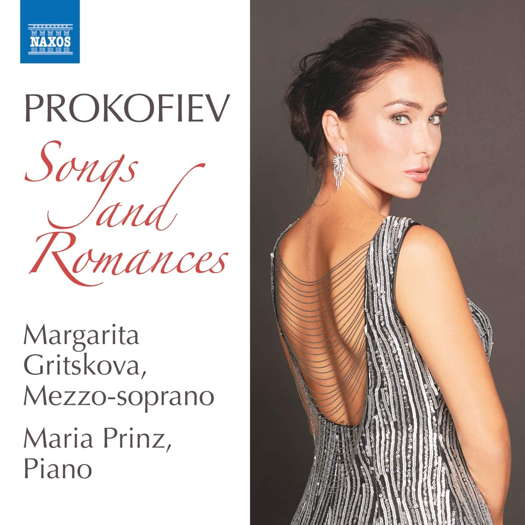- Helicon Music
- Dudley Moore
- Alexei Vladimirovich Stanchinsky
- Da Vinci Classics
- Christiane Karg
- Zodiac Trio
- Williamson: A Year of Birds
- Persians
 VIDEO PODCAST: John Dante Prevedini leads a discussion about Classical Music and Artificial Intelligence, including contributions from George Coulouris, Michael Stephen Brown, April Fredrick, Adrian Rumson and David Rain.
VIDEO PODCAST: John Dante Prevedini leads a discussion about Classical Music and Artificial Intelligence, including contributions from George Coulouris, Michael Stephen Brown, April Fredrick, Adrian Rumson and David Rain.
 SPONSORED: CD Spotlight. Beautifully Apt - Choral music by Herbert Howells, heard by Robert Anderson.
SPONSORED: CD Spotlight. Beautifully Apt - Choral music by Herbert Howells, heard by Robert Anderson.
All sponsored features >>

Soulful Awareness
PATRICK MAXWELL listens to Margarita Gritskova and Maria Prinz performing Prokofiev songs
'The voice of Margarita Gritskova, accompanied by pianist Maria Prinz, seems exactly suited to this music ...'
Prokofiev's music differs from the two figures of Rachmaninoff and later Shostakovich, who dominated the scene, albeit often from different parts of the world. Prokofiev maintains a more pastoral feeling, although he shares the innate romanticism and soulful awareness that can be found in many other areas of Russian culture. All three were hugely affected by the October Revolution of 1917 and its aftermath, and, like so many Russian writers before, were unable to successfully resist the urge to never return to or forget their homeland, despite the troublesome receptions and fears they would find there.
This new recording shows some of Prokofiev's more lyrical works in the simpler format of soprano and piano; a combination that can still evoke the same expression that the expansive orchestra works produce, a miniature version of his most famous successes. They also showed him to be a composer who could produce music that spoke to the lyrical qualities of song and the opportunities of contemporary poetry, as opposed to the works that made one audience member to once pronounce that 'The man's a wild animal'.
The voice of Margarita Gritskova, accompanied by pianist Maria Prinz, seems exactly suited to this music, mixing both her operatic side with the more tender timbre of song, although the fine balance does not always come true. The first song of this recording, The Ugly Duckling, Op 18, from 1914, shows the more idiosyncratic mix of melody and what almost amounts to recitative in the flourishes and sonority of the voice.
Listen — Prokofiev: The Ugly Duckling
(track 1, 1:12-2:03) © 2020 Naxos Rights (Europe) Ltd :
Much of this music shares the same problem of Russian song: that the language makes further appreciation often impossible, and the music at first listening seemingly impenetrable and insubstantial, lacking in the depth that other song traditions seem to achieve further West. Effete qualities are tempered by the constant sense of a deep-running integrity in all of this music, which takes the effect to another level when mixed with the poetry; this is, however, an effect not always available to the unknowledgeable listener.
Next is three of the Five Poems, Op 23, from 1915, which follow much the same literary sensitivity, the first of which sets the words of a beautiful poem, 'The Little Grey Dress', by Gippius. There is a distinct blend of the playful and tragic in this music, with the chromatic tonality animating the contrast between piano and voice. In this piece, Gritskova manages impeccably well to balance the expression with the elements of sprechgesang that help to picture the sliding and almost dream-infused music.
Listen — Prokofiev: The Little Grey Dress (Five Poems Op 23)
(track 2, 0:00-0:46) © 2020 Naxos Rights (Europe) Ltd :
The last of these songs, the more playful 'The Sorcerer', with words by Nikolai Agnivtsev, is a darker piece that makes use of the simpler text, where the piano and voice again seem in some kind of darker conversation that still evokes the lightness of the more traditional and formulaic language.
The Five Poems of Anna Akhmatova which follow are perhaps the best-known of this collection, composed in 1916 in a period of less than two weeks. This music does have the more lyrical quality, which defied Prokofiev's critics who before had not seen this element in his style. The premier of the works was an impressive success, with the composer creating a new slice of music that was, in the words of one surprised reviewer at the time, full of 'tenderness, warmth, emotion or, in short, lyrical charm'. All of these qualities are definitely evident in this music, which is perhaps more accessible than the others, and filled with a different sort of plaintive emotion than the earlier pieces, which maintains the almost uneasy balance of seemingly simple harmonies with an important depth of feeling and darkness that offers a constant contradiction, created by the use of major chords intercepted with chromatic progressions. This musical sense is backed up by the poetry, which offers the same quality of works by Osip Mandelstam, who was writing during the Silver Age of Russian Poetry, marred by the influence of growing Soviet repression.
Listen — Prokofiev: The sun has filled the room (Five Poems of Anna Akhmatova)
(track 5, 0:28-0:51) © 2020 Naxos Rights (Europe) Ltd :
Next is one short piece from Five Poems, Op 36, five years afterwards. In this song there is again the mix of the plaintive melody with the eerie insecurity that pervades much of this style. There is then the first of Two Songs from Lieutenant Kijé, a poem of Yury Tynanov, which is a hauntingly serene piece where the piano and voice for once seem to be operating completely in tandem.
The second of Two Choruses, Op 66a is a more jaunty song from 1935 that employs a much more traditional and simplistic structure, with distinct echoes of some Russian unison choral works; the work was composed in the year before the composer moved back to Soviet Russia after living abroad in America for so long, and might therefore reflect a want to appear in tune with the Socialist Realism that plagued the Soviet artistic scene.
Much of the same can be said for The Chatterbox of the next year, which exhibits much the same music that you would expect from the title in a particularly joyful manner. It bears the hallmarks of music that might well not have been written if Prokofiev had been on another continent.
Listen — Prokofiev: The Chatterbox
(track 13, 0:01-1:00) © 2020 Naxos Rights (Europe) Ltd :
That tone is defied, however, by a darker song with text by Vladimir Lugovskoy and Prokofiev himself.
Listen — Prokofiev: Mark, ye Bright Falcons (The Field of the Dead)
(track 14, 0:58-1:53) © 2020 Naxos Rights (Europe) Ltd :
This is followed by the second of a set of Three Romances, 'The rosy dawn is colouring the east' from 1936. This sets the words of Pushkin, whose poetry, speaking often as the same pastoral scenes as some of others sung in this collection, still remains the most sublime of Russian verse, and his status was along with Tolstoy and Dostoevsky as one of the finest of his nation's many writers, disturbingly promoted by Stalin at the time. This last piece is carried out with the same dexterity and nimbleness that Gritskova employs, although there are points throughout this recording when her operatic tone could have been changed for a more solemn and intimate sonority better suited to this chamber music, with a lightness of tone often misplaced when trying to create a sense of substance beyond the at first effete musical sound world.
The last of the pieces included is a setting of a Russian folksong, from a collection of twelve composed in 1944. The sixth, Katerina, again shows the impact of state pressure, in this case this need for setting traditional tunes to modern music, without the experimentation still allowed in the West.
Listen — Prokofiev: Katerina
(track 16, 0:00-0:50) © 2020 Naxos Rights (Europe) Ltd :
Indeed, it can still somehow remain a mystery in a way, why many of the twentieth-century's best Russian composers decided to either stay or return from exile to their native country, given the highly suspicious political atmosphere. As with other artists from well before their time, it seems to be a deep-rooted idea of the Russian soul and its need for music and other passionate cultural movements. These pieces help to give an explanation of that phenomenon, and show the progress of one composer's particular journey.
Copyright © 6 August 2020
Patrick Maxwell,
Buckinghamshire, UK

CD INFORMATION - PROKOFIEV: SONGS AND ROMANCES
FURTHER INFORMATION: SERGEI PROKOFIEV
FURTHER ARTICLES ABOUT RUSSIA AND ITS MUSIC


